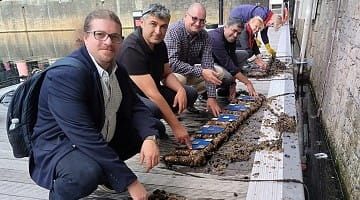Why study this course with LJMU?
- Study the behaviour of wild and captive animals, with opportunities for overseas fieldwork
- Regular field trips and visits to observe the behaviour of animals, including residential fieldwork at Level 4 to Millport, Isle of Cumbrae in Scotland
- Optional residential fieldwork (partially self-funded) at level 5 (possible destination Cairngorms National Park, Scotland) and level 6 (possible destination Coto Doñana, Spain)
- Taught by animal behaviour experts at the forefront of modern research
- Opportunities for work-related learning, study abroad and/or a year-long sandwich placement
- Specialist lectures from visiting animal behaviour experts
- 100% of students surveyed said teaching staff on this course were good at explaining things (NSS 2024)
- International Foundation Year course available offering direct progression onto this degree programme
About your course
Studying BSc (Hons) Animal Behaviour at Liverpool John Moores University will give you an opportunity to learn from experts in animal behaviour and complete work-related learning with a variety of animal-related organisations, such as zoos, wildlife parks, conservation NGOs and rescue centres. The degree develops your understanding of the science of animal behaviour in relation to evolution, ecology, physiology, neurobiology and genetics, preparing students for a career in science, animal welfare, animal behaviour research, the emergency services or conservation.
Foundation Year
The Foundation Year is ideal if you have the interest and ability to study for a degree, but do not have the qualifications to enter directly onto the Animal Behaviour honours degree programme yet.
Once you pass the Foundation Year you will progress directly onto the first year of the honours degree. If you are a full-time UK student, you will qualify for student financial support for the full duration of your course (subject to eligibility criteria).
About BSc (Hons) Animal Behaviour
Modules cover animal behaviour in a range of environments from natural behaviour in the tropics and temperate habitats; terrestrial, freshwater and marine ecosystems; through to the behaviour and welfare of domestic and captive animals.
Regular field work underpins the development of theoretical knowledge, giving students the practical skills to engage in the study of animal behaviour. An important part of the programme is the training in scientific observational methods. Students will have opportunities to try out their techniques on wild animals in the UK, including in our on-campus wildlife gardens, and abroad, as well as on captive animals in the world famous Chester Zoo, Martin Mere Wetland Centre, Blue Planet Aquarium and Knowsley Safari Park, which are all close by, along with a range of natural habitats and protected areas.
There is a core residential field trip in Level 4 and an optional residential field trip during Level 5. Students can also take part in an advanced field skills expedition during Level 6 the possible destination is the superb Doñana area in southern Spain to observe first-hand how animals behave in their natural habitats. You can also choose to study at a different university for one semester in our Study Abroad Programme.
On top of your academic studies, you will have the opportunity to undertake a short (4-6 week) work-based placement and/or a year's sandwich placement in the UK or abroad. Placements give you a chance to put your skills and knowledge into practice, as well as developing personal and subject-related skills and acquiring new skills to enhance your CV. They could even lead to employment with the same organisation or through the contacts you make.
The first year of the course is very similar to LJMU's Zoology programme and as these are sister degrees you can transfer between programmes if you complete Level 4 successfully.
Course modules
What you will study on this degree
Further guidance on modules
Modules are designated core or optional in accordance with professional body requirements, as applicable, and LJMU’s Academic Framework Regulations. Whilst you are required to study core modules, optional modules provide you with an element of choice. Their availability may vary and will be subject to meeting minimum student numbers.
Where changes to modules are necessary these will be communicated as appropriate.
Core modules
Core modules
Core modules
Optional modules
Core modules
Optional modules
Professional accreditation
Professional organisations such as the Association for the Study of Animal Behaviour (ASAB) offer membership.
Your Learning Experience
Excellent facilities and learning resources
We adopt an active blended learning approach, meaning you will experience a combination of face-to-face and online learning during your time at LJMU. This enables you to experience a rich and diverse learning experience and engage fully with your studies. Our approach ensures that you can easily access support from your personal tutor, either by meeting them on-campus or via a video call to suit your needs.
Teaching is via a combination of lectures, fieldwork, laboratory work, workshops, tutorials, and online with emphasis on either a research project and/or work-related learning in the third year. This independent study is an important aspect of the course as it gives you a chance to put into practice skills and knowledge gained in Levels 4 and 5.
Work-related Learning
This course provides plenty of opportunities for first-hand experience of working in the animal behaviour field via an optional year-long sandwich placement between Levels 5 and 6, and/or a short 4-6 week work-related learning placement in Level 6.
A placement tutor will help you find the right placement, either in the UK or overseas, and once you start, you will have regular support from a supervisor who will visit you in your workplace.
Placements give you a chance to put your skills and knowledge into practice, as well as developing personal and subject-related skills and acquiring new skills to enhance your CV. They could even lead to employment with the same organisation or through the contacts you make. The decision to undertake a placement is made early in your second year; alternatively you can choose to complete the course in three years.
Dedicated personal tutor, plus study skills support
There will be times during your course when you need guidance and advice related to your academic studies or more personal matters. For this reason, you will be guided through the programme by a personal tutor with whom you can discuss course material informally as part of a small tutorial group or have one-to-one progress review meetings. You will also be allocated a supervisor for your project or work-related learning, and your year-long placement if you choose the sandwich option.
The school is fully committed to promoting a learning environment that supports a culture of equality, diversity and inclusivity (EDI) and has a Disability Support Coordinator, an EDI Coordinator and a School EDI Working Group. Personal Tutors also play a vital role in promoting awareness of support services for students.
Assessment varies depending on the modules you choose, but will usually include a combination of exams and coursework.
End of year exams may include a range of question types such as multiple choice, short answer, interpretative, problem-based learning and essay, whereas coursework assessments are made up of phase tests, fieldwork/practical reports, data handling, oral presentations, poster presentations, group discussions, essays or the evaluation of practical skills. While most of your assessments will be based on individual work you will also complete some group work.
Feedback on coursework assessments is normally provided within three weeks of submission and may be via Canvas (our virtual learning environment), face-to-face or in writing. We believe that constructive feedback is vital in helping you identify your strengths as well as the areas where you may need to put in more work.
Where you will study
You will study at the Byrom Street site in the university's City Campus in the heart of Liverpool. You will have access to first class teaching facilities, laboratories and study areas. The Avril Robarts library is within easy walking distance and here you'll find all the information you need to support your studies.


I found the course incredibly interesting and it really sparked my love and curiosity for science. It covers many different aspects of animal behaviour so when you graduate you can choose which path you would like to take whether it is wildlife conservation, animal training or the behaviour and welfare of pets or production animals
Career paths
You will enjoy varied career opportunities both in the UK and overseas
You might, on the other hand, prefer to practise as a professional animal behaviourist after some further postgraduate study and clinical training.
Recent LJMU graduates have secured full-time employment in roles such as Research Officers, Animal Colony Managers and Animal Welfare Coordinators. Organisations that have hired our graduates include: Combe Martin Wildlife Park, Chester Zoo, Dolphin Quest, Durrell Wildlife Conservation Trust, Genus, Newquay Zoo, North Clwyd Animal Rescue, RSPCA and Reaseheath College.
Other graduates have opted for postgraduate study (teacher training, MSc, MPhil or PhD), pursuing a career in science and academia or other competitive undergraduate courses (such as medicine, veterinary science or midwifery). Some have also set up their own businesses (including a pet behaviour consultancy) or have taken non-animal related graduate employment.
Student Futures - Careers, Employability and Enterprise Service
A wide range of opportunities and support is available to you, within and beyond your course, to ensure our students experience a transformation in their career trajectory. Every undergraduate curriculum includes Future Focus during Level 4, an e-learning resource and workshop designed to help you to develop your talents, passion and purpose.
Every student has access to Careers Zone 24/7, LJMU's suite of online Apps, resources and jobs board via the LJMU Student Futures website.
Tuition fees and funding
- Full-time per year:
- £9,250
- Placement year:
- £1,850
Fees
The fees quoted above cover registration, tuition, supervision, assessment and examinations as well as library membership and student IT support with access to printed, multimedia and digital resources including programme-appropriate software and on campus Wi-Fi.
Financial Support
The University offers a range of scholarships to support students through their studies. You'll find all the information you need on our specialist funding pages, including details of the Student Support Fund and other activities to support with the cost of living.
Additional Costs
In addition to fees, students should also keep in mind the cost of:
- Accommodation
- Travel costs including those for placements, visas and travel for studying abroad and field trips unless paid for by LJMU
- Stationery, IT equipment, professional body membership and graduation gown hire
The University reserves the right to increase tuition fees in accordance with any changes to the maximum allowable fees set by the UK Parliament. In the event of such a change, any fee increase will be subject to a maximum cap of 10% of the total course cost as originally stated at the time of your offer.
* Practical and field activities underpin all programmes in the School. PPE is provided for all necessary practical work. There are no costs for day field trips for core and optional modules. Residential field trips associated with core modules are subsidised and include travel and half-board accommodation costs. Any residential field trips for optional modules are also subsidised, but will have costs involved. Locations may be subject to change and also subject to national and international travel restrictions.
A DBS check is not required for your application, however a DBS may be required for modules where there is a work based learning placement option. Work based learning placements that do not require a DBS check are available.
Entry requirements
Please choose your qualifications below to view requirements
Grades/points required from qualifications: 72-80 / DDD - CDD
Work out how many UCAS points your qualifications are worth by visiting the UCAS Tariff Calculator.
Qualification requirements
How to apply
Securing your place at LJMU
UCAS is the official application route for our full-time undergraduate courses. Further information on the UCAS application process can be found here https://www.ljmu.ac.uk/study/undergraduate-students/how-to-apply.
Your university life
From accommodation and academic support to clubs and societies. Find out what LJMU has to offer.
Related Links
Talk to our students
Connect with a current LJMU student for advice and guidance on university life, courses and more.
See what our students are saying
At LJMU we want you to know you're making the right choice by studying with us. You can see what our students are saying about their experience with us through their reviews on the following websites:
Related Links
News and views
Browse through the latest news and stories from the university
The university reserves the right to withdraw or make alterations to a course and facilities if necessary; this may be because such changes are deemed to be beneficial to students, are minor in nature and unlikely to impact negatively upon students or become necessary due to circumstances beyond the control of the university. Where this does happen, the university operates a policy of consultation, advice and support to all enrolled students affected by the proposed change to their course or module.
Further information on the terms and conditions of any offer made, our admissions policy and the complaints and appeals process.





























